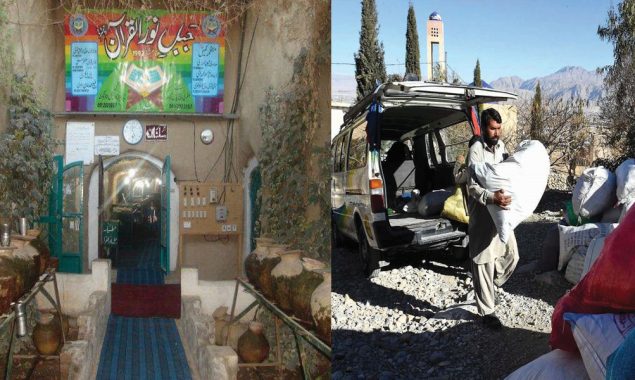Synopsis
Jabal-e-Noorul Quran is a unique complex of caves to put away crumbling copies of sacred texts

Quetta, the provincial capital of Balochistan, is a valley surrounded by large black mountains, whose tips remain covered in a layer of white snow well into March after a good winter.
These mountains, Koh-e-Chiltan, take their name from a dark and somber legend. However, one of these rugged mountains to the west of the city has undergone a transformation in the recent past and is now assuming the character of a sacred place where people go in search of spiritual peace.
Jabal-e-Noorul Quran, which literally translates as “mountain with the light of the Quran”, is a complex of around 70 natural and man-made caves where an eponymous charity organization has been at work for the last three decades to put away old and crumbling copies of the Quran and other sacred books.
According to the founders of the organization, they decided to build the place in 1992 to properly put the books and pages which go brittle with time but which contain texts primarily from the holy book.
They said the initiative was based on the injunction of Islamic sharia which calls for respectfully handling and disposing of the old and crumbling pages carrying sacred writings.
The organization collects these books and pages from the boxes attached to electricity and telephone poles across Quetta and beyond. These boxes – usually green in color – are inscribed with a request to people to use them for putting away old copies of the Quran and other religious texts.
Once brought to Jabal-e-Noorul Quran, the volunteers from the organization sort these books and pages. The pages which are beyond repair are respectfully packed in sacks and placed in one of the caves while some books are repaired, preserved and put on display at a cave museum.
The museum contains some rare old editions of the Holy Quran and its translations in English, Gujarati, Farsi, Urdu, Sindhi, Balochi, Pashto and other languages. The caves at Jabal-e-Noorul Quran are divided into four parts – A, B, C and D – according to the type of books and pages they contain.
Over the years, old books and pages have also started to flow in from other parts of Balochistan and even other provinces of the country and the mountain has started taking on the proportions of a sacred place which people visiting it with their families.
The visitors recite the Holy Quran and offer prayers in the well-lit caves, some which are supplied with prayer mats.
One of the visitors, Nawab Khan – a resident of Sariab area of Quetta –said he visits the place for peace of mind and for getting closer to God. “I have brought my family here to show them how they have kept the old copies of the holy Quran,” he added.
According to Nawab, the government should also help in developing the mountain so that people of other parts of the country may also visit it.
Another visitor, Jaffar Khan, said the place showcases centuries-old copies of the Quran. “They are kept safely in cloth, plastic sacks and glass showcases. It’s something all of us must know about,” he added.
People’s growing love and devotion to the place can be gauged from the fact that some people have asked their family members to bury them at the mountain after their deaths and have even marked the places on the site where they wished to be interred by constructing their mock graves.
Jabal-e-Noorul Quran is a haven of sacred books and a spiritual place for people, whose growing numbers seek refuge in its solemn peace from the sorrows and monotony of a materialistic life.
Read More News On
Catch all the Quetta News, Breaking News Event and Latest News Updates on The BOL News
Download The BOL News App to get the Daily News Update & Follow us on Google News.




